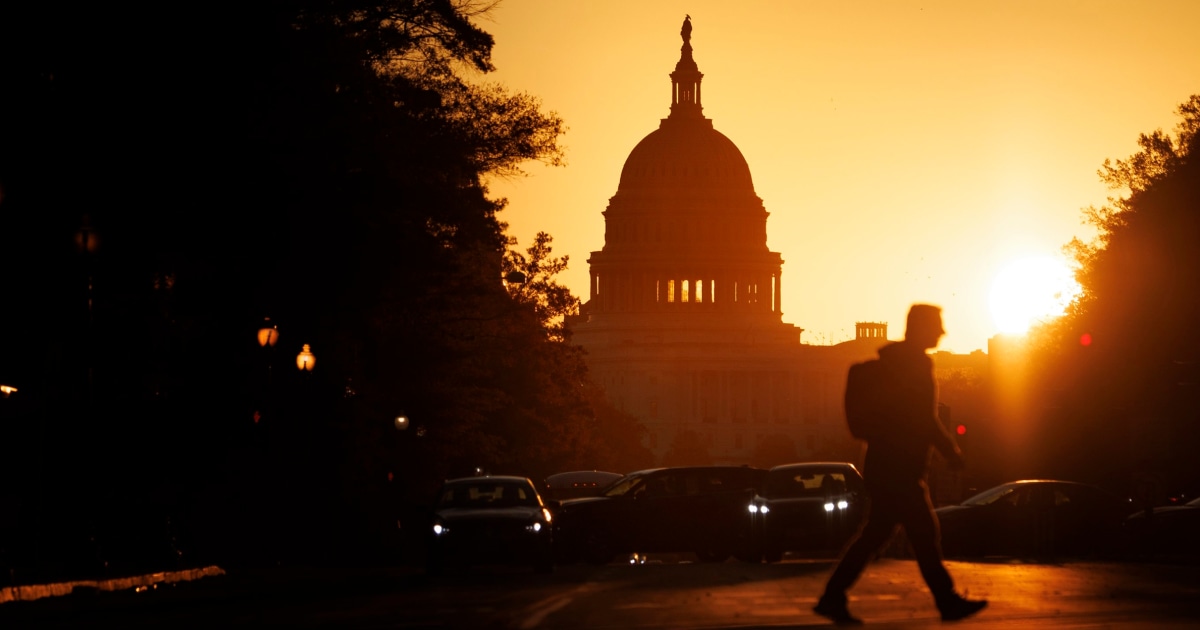WASHINGTON — The Senate passed legislation Monday night to reopen the government and end the record-long shutdown after eight Democrats broke with their party and joined Republicans to break the logjam.
The vote was 60-40, with every Republican except Sen. Rand Paul of Kentucky voting in favor of the measure.
The measure now goes to the House, which could vote as early as Wednesday to pass the package and send it to President Donald Trump, who said Monday that he supports the bipartisan deal.
Senate passage came after a long vote series to reject several amendments and package the components of a deal into one.
The legislation includes a “minibus” of three full-year appropriations bills, including a full funding of SNAP benefits through the end of next September, and keeps much of the government open on a short-term basis through Jan. 30.
But in a major concession for Democrats, the deal does not include an extension of expiring subsidies under Obamacare, or the Affordable Care Act, after Republicans held firm against continuing those funds. That means more than 20 million Americans could see their premiums spike next year.
“The American people have now awoken to Trump’s health care crisis,” Senate Minority Leader Chuck Schumer, D-N.Y., said Monday before voting against the legislation. “Democrats demanded that we find a way to fix this crisis and quickly, but Republicans have refused to move an inch. So, I cannot support the Republican bill that’s on the floor because it fails to do anything of substance to fix America’s health care crisis.”
The Senate deal with Republicans was struck by Sens. Angus King, I-Maine, Jeanne Shaheen, D-N.H., and Maggie Hassan, D-N.H. Joining them to support the measure were Catherine Cortez Masto and Jacky Rosen of Nevada; Dick Durbin of Illinois; John Fetterman of Pennsylvania; Tim Kaine of Virginia.
“This was the only deal on the table,” Shaheen told reporters before the vote. “It was our best chance to reopen the government and immediately begin negotiations to extend the ACA tax credits that tens of millions of Americans rely on to keep costs down.”

Durbin said that while he shares other Democrats’ misgivings about the Trump administration, he “cannot accept a strategy that wages political battle” at the expense of paychecks for federal workers by keeping the government closed.
Despite backing down on their main demand during the shutdown, the Democrats walked away with a promise by Senate Majority Leader John Thune, R-S.D., to vote on an ACA funding bill by the end of the second week of December. But there’s no guarantee that will achieve the 60 votes necessary to pass, which is why most Democrats voted against the negotiated bill.
King said reopening the government boosts the prospects of an ACA funding extension to “maybe 50%,” but he added, “I can’t guarantee a result. Nobody can.”
And in a bad omen for that cause, all 53 Senate Republicans voted Monday against including a simple one-year extension of the ACA funds, proposed by Sen. Tammy Baldwin, D-Wis., in the funding bill. That vote came in the run-up to final passage.
Speaker Mike Johnson, R-La., held a conference call with House Republicans on Monday morning and laid out a potential timetable for votes this week after the chamber has been out of session since Sept. 19, according to four sources on the call.
Johnson said he’s hoping to vote as soon as Wednesday on the Senate’s deal to re-open the government. Still, even though the vote timing is fluid, members were encouraged on the call to start getting back to D.C. as soon as possible given the air travel delays.
The speaker also vowed that, before the House votes, he will swear in Democratic Rep.-elect Adelita Grijalva, who won her special election on Sept. 23. The House has been out of session since Sept. 19 in an unusually long and unscheduled recess.
Following her swearing-in, the House will then vote on a rule for the Senate deal, followed by final passage, and then the House will leave town again, Johnson told members on the call.
While the House vote is expected to be tight and leadership is still in the process of doing a whip check, Johnson expressed confidence that they’d be able to pass the Senate’s government funding package, the sources said.
House Minority Leader Hakeem Jeffries, D-N.Y., said House Democrats are “focused on dealing with the bill that’s coming over from the Senate to the House, and we’re going to fight hard to defeat it.”
Asked if the shutdown was worth it, Jeffries said Democrats “waged a battle on behalf of the American people.” He added that “the fight lives on.”
Jeffries deferred to House Minority Whip Katherine Clark, D-Mass., when asked if all Democrats will vote against the bill.


